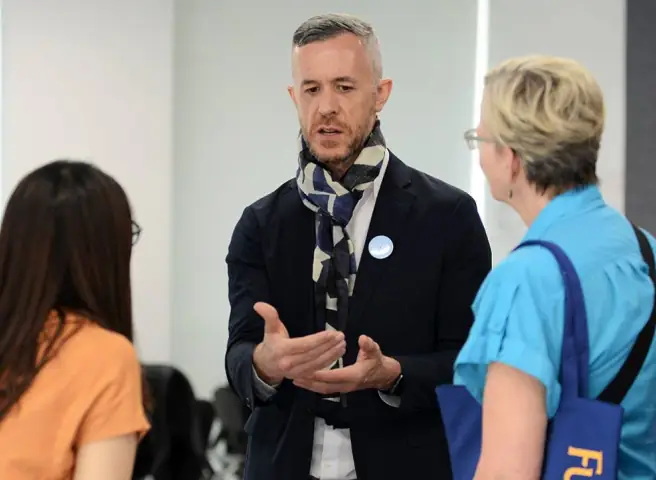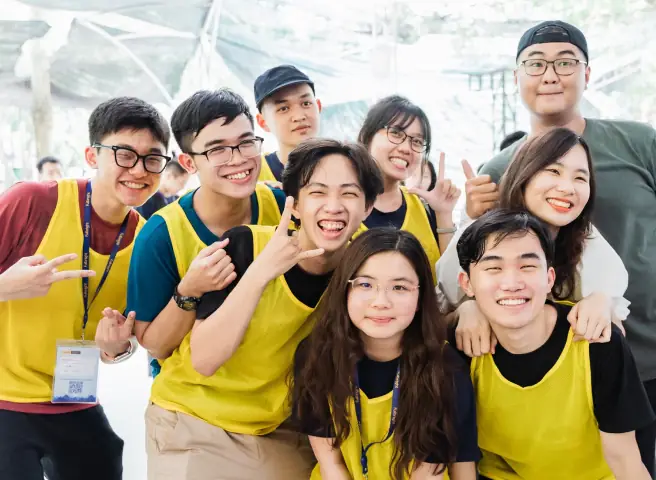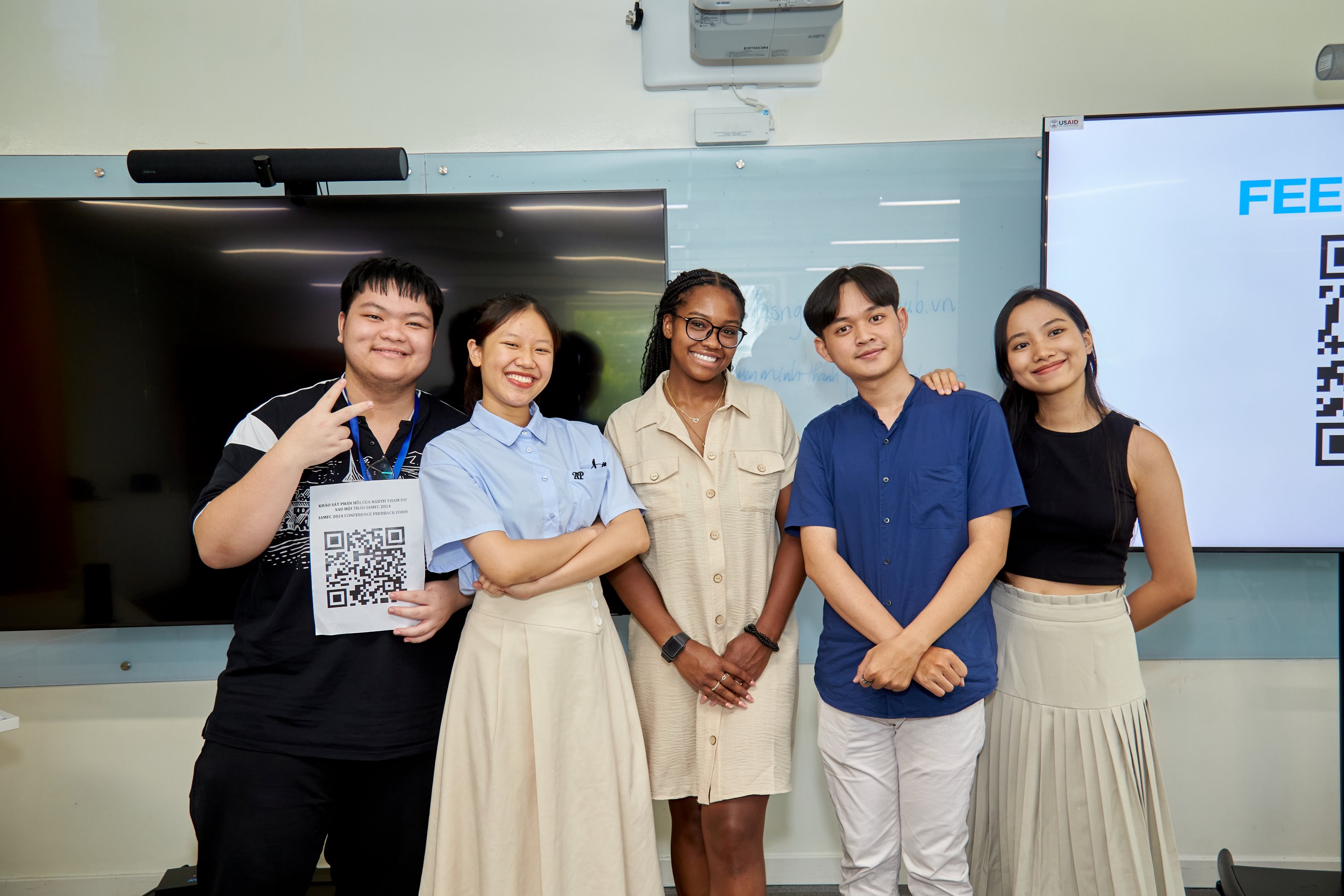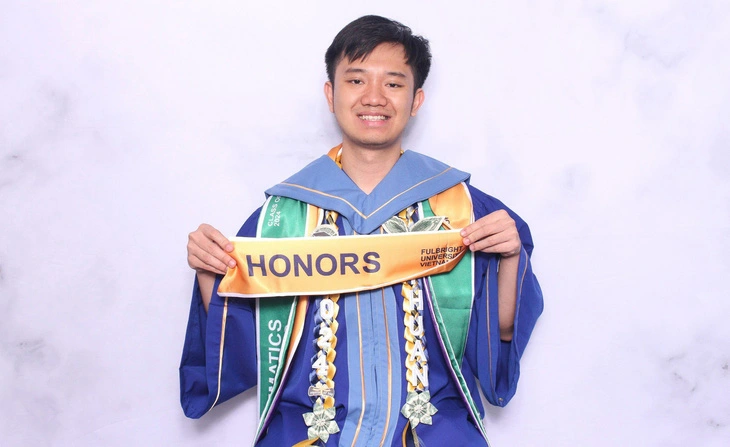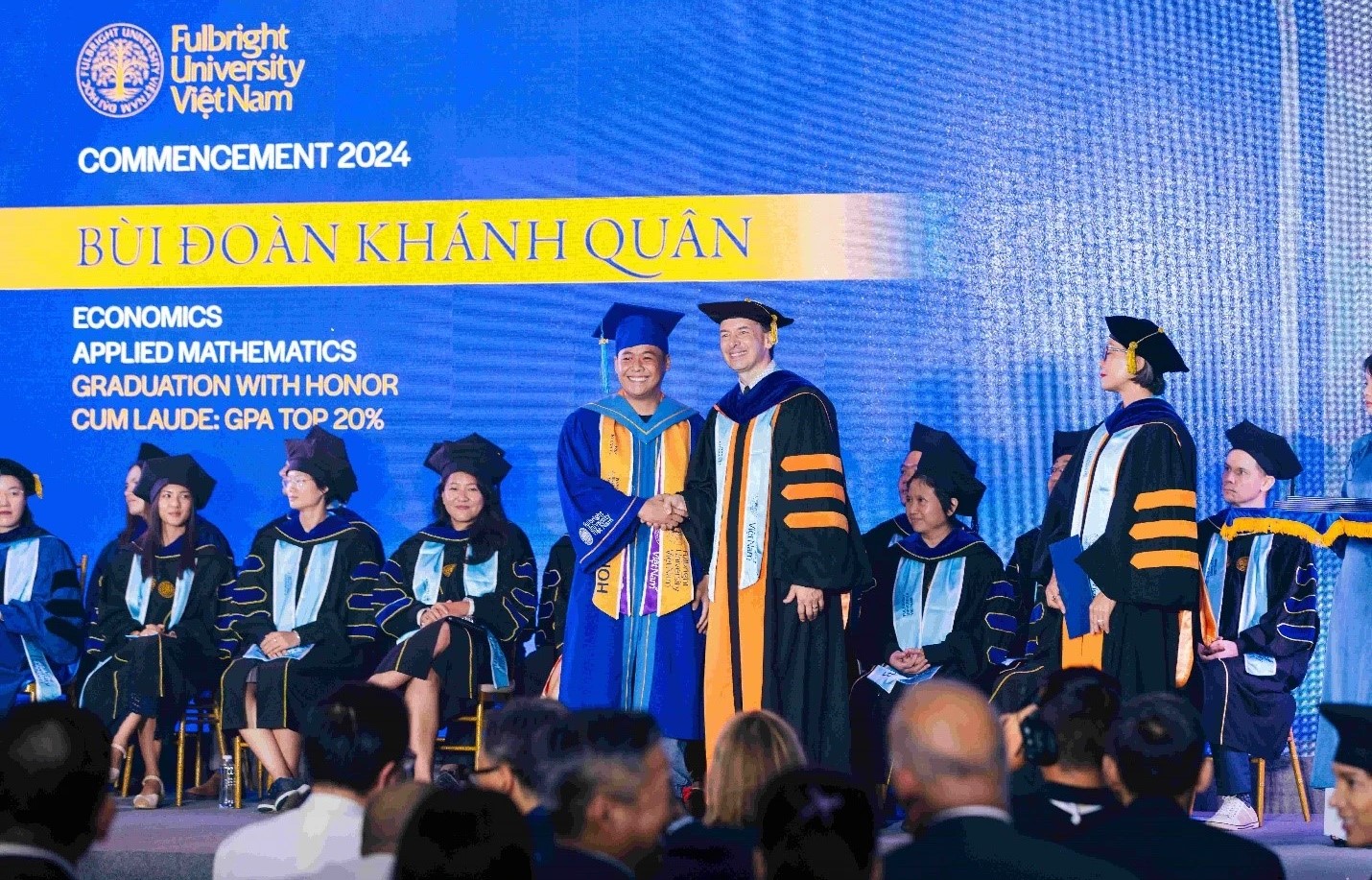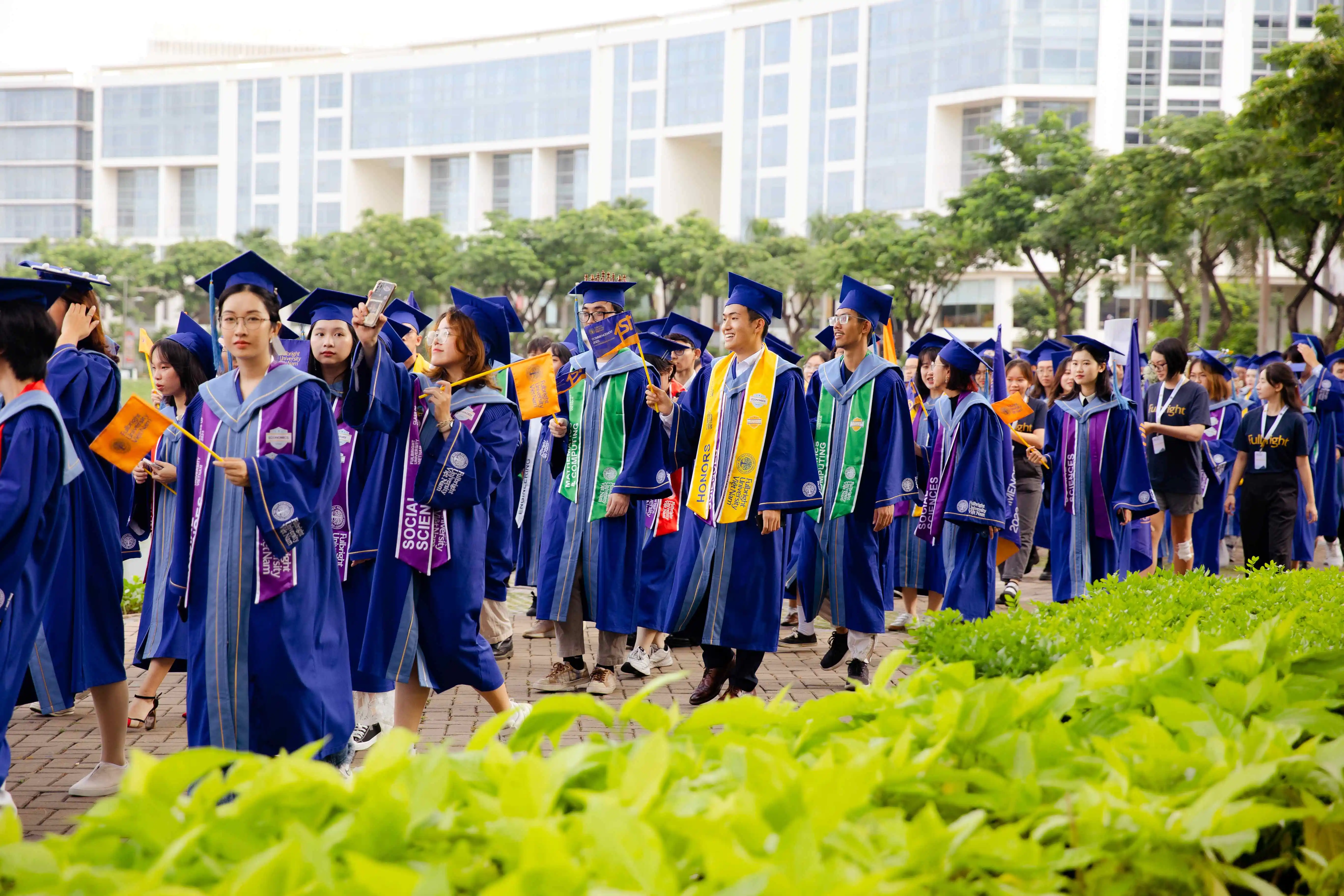
I celebrate myself,
And what I assume you shall assume,
For every atom belonging to me as good belongs to you [… ]
I exist as I am, that is enough,
If no other in the world be aware I sit content,
And if each and all be aware I sit content.
One world is aware, and by far the largest to me, and that is myself,
And whether I come to my own today or in ten thousand or ten million years,
I can cheerfully take it now, or with equal cheerfulness I can wait.
Class of 2027, parents of the class of 2027, distinguished partners and guests of the university – these famous words open Walt Whitman’s great 19th century poem, Leaves of Grass. Leaves of Grass was a work that Whitman – pictured here when he was 36, the time he published the first edition of the poem – continued to perfect his whole life. What relevance could this somewhat mystical poem have for our Fulbright convocation, some 150 years later and thousands of miles away?
The truth is, his poem came to mind, unexpectedly, as I prepared my thoughts on what to share with you today. When it did, I could not shake the thought that Whitman had a powerful message to share with us, one that helps us understand the moment that you are currently experiencing, the community you are about to join here at Fulbright. And conveniently, it helps me say what I think is true and deep about the three words chosen to embody our convocation this year, that is: flex, converse, and immerse. I will take each of these three words in turn, and reflect on what they might mean for you individually as an entering Fulbrighter.
Flex
So let’s start with the word “Flex”. When I was told, a couple of weeks ago, about the convocation theme, I thought I misheard it, and that it was “flexible”. No, it was “flex”. I had to ask my 16-year old daughter what “flex” means… so that tells you how old I am, right?! She said it meant a lot of things, like being proud of your accomplishments, and willing to show that you’re proud.
“I celebrate myself” – sings Whitman – and clearly, no one in the 19th century was flexing more than Walt Whitman. But the question is how? What was the nature of Whitman’s ‘flex’?
Like all good poetry, there are probably as many answers to that question as there are readers. But let me offer my own Whitman-inspired vision for ‘flexing’ at Fulbright – we are celebrating our common humanity, our common dignity, and the sheer joy of being alive, connected and growing.
This kind of flex is not based on being better than anyone else. Look around you – the person to the left and the right, to the front and to the back of you. Each of you has a unique story that has brought you to this point, to be sitting in this room, to be entering this community – one that will undoubtedly shape and change your life. Whitman’s message begins with this powerful point that you belong here – on this earth, and in this community. You may feel stress, doubt, confusion. You will have your current weaknesses – heaven knows we all do. But that does not detract one bit from the fundamental premise that you are also a miracle of existence, and an absolutely unique intersection of the world, coming together exactly in the way that you are now, and no other –
And you worthy of celebration. As a concrete manifestation of this, think of this moment –
[show video of new students at orientation being greeted on campus by current students, of which the following is a screenshot] –
Here you see Fulbrighters, each of whom had been welcomed before in their time, welcoming, supporting and yes – on a deep level, celebrating – each new arriving member of the community in turn.
Fulbrighters, I want each and every one of you incoming students to know this: we are community that celebrates the individual worth of each and every one of you. Your success is our success – there is no other definition. So celebrate yourself – and we will celebrate you too, through good times and difficult ones, every step of the way. When you flex, we flex – because you belong here.
Converse
So now, let’s say you are flexing big at Fulbright – what do you do next? The answer is well suggested by our next theme – CONVERSE. Let’s start with Whitman – shown here now a good 20 years older, and still working on his draft poem – in our next verse from Leaves of Grass —
All truths wait in all things,
They neither hasten their own delivery nor resist it,
They do not need the obstetric forceps of the surgeon,
The insignificant is as big to me as any,
(What is less or more than a touch?)
Logic and sermons never convince,
The damp of the night drives deeper into my soul.
Whitman’s theme here seems almost mystical – all truths wait in all things – but I believe he is pointing to an underlying truth that is core to the Fulbright educational philosophy and curriculum, which is about how to converse.
To see why, consider when most people study at university, they are beginning with a particular specialization and set of skills that they want to go deep into. Why do you go to a university, in 99 out of a 100 cases in Vietnam or elsewhere? Simple – you go to study something. You study computers. You study business – or perhaps re specifically, a further specialization like marketing. You study engineering. You study these in their general theories, at the most abstract level. And then, at least if you’re lucky, you will study their potential applications, hoping that you’ll be able to follow those steps when you get out into the so-called ‘real world’.
There is nothing inherently wrong with this approach – it works for many people – but our critique is this: that it narrows your perspective and your possibilities for solving problems. There’s an old adage that goes “If you are a hammer, the whole world looks like a nail”. Specialization brings the danger that you miss opportunities to really understand, diagnose and respond effectively to the human condition and to real-world problems.
So at Fulbright, we take a different approach. We begin in our core curriculum with a series of courses, the intention being not just to introduce you to different fields – it’s not just additive, meaning your chosen field plus forcing you to add some other subjects, as some people might misunderstand. No, the approach, through different courses such as “Scientific Inquiry” , “Quantitative Reasoning for a Digital Age” and “Design and Systems Thinking”, among others – is to give you a chance to develop, in a systematic fashion, your intellectual resources and recognition of interdependence. “All truths wait in the interdependence of all things” – to paraphrase Whitman.
So what you really end up with at Fulbright is a rich appreciation of the interconnectedness of human knowledge, one that looks more like the following Venn diagram than a narrow specialization [see slide below]. We’re looking for the connection between different themes and issues, the multidimensionality of problems. By the end of year 2, this supports further specialization such as the selection of one of currently 11 majors – but you approach these with a rich analytical foundation – your mind will not just have a hammer, but a full range of tools to use, and just as importantly, lenses through which you can view problems in all their rich complexity. As Einstein once said, “Problems can’t be solved by the same mindset that created them…”. What we’re building is as much the ability to adapt a new mindset as a narrow, technical solution to a given problem.
But there is more to an educated, prepared mind than even this rich intellectual understanding. As Whitman also wrote in the above selection, “logic and sermons never convince / the damp of the night drives deeper into my soul.” Thus the other key departure Fulbright introduces from the traditional university model is the experiential learning that we emphasize across the curriculum, in each year. It is based on the idea that you can’t just think your way through the connections between domains of knowledge, you have to actually have the opportunity to build your own capacity to address complex real-world challenges. Such opportunities could come in the form of working through design challenges in our maker space, for instance, or through the team challenge you just encountered during orientation, in which you were asked to design an intervention that can support the wellness of the Fulbright community. You will also experience this through internships, pre-professional experiences, capstones, and research projects. Such exposure will take several different forms, but they all aim to challenge your understanding within real world constraints, and to force you to act effectively in the world, with all its messy complexity – and typically in teams.
What unites our approach is a simple, common focus across the Fulbright curriculum and co-curricular offerings – that is, putting the focus in everything we do on the individual learner, and on human values in education. We begin and end with the humanity, values and growth of the learner, rather than from the disembodied “information” of a specialist field. That’s what makes for the Fulbright difference. And if this seems too theoretical – just remember another famous phrase, “nothing is as practical as a good theory.” Or consider another piece of poetry, this time from T.S. Eliot:
Where is the wisdom that we have lost in knowledge?
Where is the knowledge that we have lost in information?
So Eliot is pointing out here, half a century before anyone was talking about the internet, that we are awash in a sea of information in the digital age. How, he wonders, can we turn that sea of information into useful and applicable knowledge for human life?
But that’s also insufficient. There is also, “Where is the wisdom that we lost in knowledge?” Even when we have unlocked knowledge itself – think of all the “useful knowledge” that AI and tools such as Chat GPT are synthesizing nearly instantaneously, and more generally, think of all the progress that the scientific and digital revolutions have brought in their wake – this knowledge still can’t give us the answers we need to the fundamental question of what we should do, and how we should live. Such questions cannot be after-thoughts; they are the reflection and embodiment of wisdom. AI can tell you everything there is to know – but not what it is that is worth knowing – let alone worth doing in a life that is so limited by a finite number of years, and in a world that is so limited by finite resources.
Let me go back to this slide to show an example of how what one could call the Fulbright approach to cultivating wisdom might come to life. So imagine the following scenario: the world has just experienced a long pandemic, during which many students had to take classes online instead of in person (does this sound familiar?!). And that research now shows that after all this time, many K-12 students are experiencing significant education loss – as measured in a decline in math test scores, for instance – as well as much higher rates of anxiety and mental illness.
Now imagine that you, a Fulbright graduate, are part of a team of people from the Ministry of Education, schools, a consulting firm and the academic community that is brought together to design and coordinate a response to address that problem of learning loss. To make any headway, the team would have to first understand the problem in its multidimensional causes, drawing on different fields of expertise – perhaps psychology, education policy, teaching and learning support, statistics (to understand the magnitude of the problem), demographics and sociology (to understand how it has affected different groups differently), IT (if the digital divide and technology design are part of the issue, as they surely would be), economics and finance (to understand how to finance improved digital access, etc. No one person will have all the intellectual resources needed. Ask yourself this: if everyone is just a specialist – a room full of ‘hammers’ – who can bring them together? Who can “converse” – that is, bring ideas and people into meaningful dialogue – in a way that helps make positive change on the ground happen?
What field would you have to study to be a change-making leader of that study?
What we believe is that the answer doesn’t lie in any particular field but in the quality of mind and one produced by the kind of education that we aim to cultivate at Fulbright. Our proposition is this – that in this scenario, one would want a Fulbright graduate, almost regardless of their specific major, to lead that team and its problem solving – because such an individual will have the capability and confidence to both appreciate and synthesize contributions across multiple domains, and to work effectively in teams to get such complex work done and properly implemented. It is no small task, Fulbrighters, to be thought leaders and change makers – which is what this really comes down to. But we believe in you, and in the common work of our educational process – both curricular and experiential – to get you there.
In summary, this interplay of ideas and this ability to connect with others, from diverse perspectives, through respectful and problem-solving dialogue – this is what a “Fulbright conversation” is all about – and this is why “converse” is the second theme of this convocation.
Immerse
Afoot and light-hearted I take to the open road,
Healthy, free, the world before me,
The long brown path before me leading wherever I choose.
Henceforth I ask not good-fortune, I myself am good-fortune,
Henceforth I whimper no more, postpone no more, need nothing […]
Strong and content I travel the open road. […]
The east and the west are mine, and the north and the south are mine […]
All seems beautiful to me.
We have of course come to the third of our themes, immerse, and to our next selection from Whitman’s Leaves of Grass, entitled “The Song of the Open Road” – and here too you see Whitman as the wizard he really was the whole time, after working on and perfecting his poem throughout his life.
Fulbrighters, you’ll be happy to know I will keep this final message simple and joyful – immerse, to me, means to embrace this moment for you to grow – embrace Whitman’s open road to your own future. You will find your university years to be a time when you can focus on your own growth more than you can at virtually any other time in your life. Embrace that. Use the resources and people of the university – all of them – to propel you forward in doing that. We are fellow travelers on this open road.
In fact, Whitman actually concluded ‘The Song of the Open Road’ with the following words:
Camerado, I give you my hand!
I give you my love more precious than money,
I give you myself before preaching or law;
Will you give me yourself? will you come travel with me?
Shall we stick by each other as long as we live?
Isn’t that a wonderful way to end the poem? A poem which has travelled from “I celebrate myself” to “shall we stick by each other as long as we live?”
You are now joining this community, our beloved university, as Fulbrighters forever. You will watch our still young university grow, and contribute to its growth – even as you yourself grow. You made a choice to come here, among all the other choices you could make – and that is a deep and meaningful choice that will shape your future in ways you already can imagine and in many ways you can’t. That is precisely the beauty of the open road.
Alright, this has been a long speech: let’s recap my three messages for you on this convocation day, Fulbrighters –
Flex – because you belong here, and so do your amazing and diverse classmates.
Converse – because information only becomes knowledge, which then only becomes wisdom, when we when we engage with each other in deep conversations devoted to true understanding.
And Immerse – immerse yourself in this moment, because none will be better for your own growth, and when you grow and succeed, we all grow and succeed together at Fulbright.
Thank you.
